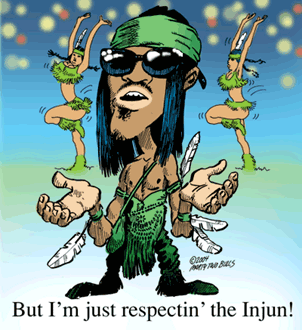Why Blacks should be as outraged as American Indians over OutKast’s Grammy parody of Native culture
By Sabrina Miller
No, my great-great grandmother was not a Cherokee princess. As you may well know, almost every Black person claims one in the family.
My great-great grandmother was actually a full-blooded member of the Mississippi Band of the Chickasaw Nation. Her name was Betsie and she married a Black man named Howard. She had many children, among them a daughter named Elizabeth who had a daughter named Louise who had a daughter named Elizabeth who had a daughter named Sabrina.
I know this story because my grandmother, Granny Louise, always told us. Family members always attributed her light skin, high cheekbones, “cat” hair and blue-gray eyes to Betsie. Although I always thought it could just as easily have been the result of some generations old dalliance between a slavemaster and one of Granny’s slave ancestors.
I know this story, the story of Betsie, because growing up my sister’s high cheekbones were attributed to her. Betsie, they used to say, was the reason I had a “good grade of hair.” My hair flowed to the middle of my back as a child, was soft as cotton and straightened like silk with even a mildly warm straightening comb, all thanks to this Chickasaw ghost named Betsie. My Mother had coloring I always thought was a beautiful mix of amber, rust and gold. She always called it “ruddy.” My Granny, of course, said Ma got her coloring from Betsie.
Nobody knew much more about Betsie other than that she was a Chickasaw who married a Black man and obviously had the power to give physical attributes African-Americans consider “desirable” to her children.
But as a writer and an amateur historian I’ve tried my best, with limited information, to give her historical presence in my family some context.
And so I learned that the Chickasaw were one of the “Five Civilized Tribes” (the others being Choctaw, Cherokee, Creek and Seminole) that settled in territory that came to be known as Mississippi, Georgia, Louisiana, Florida, Alabama. The Chickasaw were forcibly removed to Indian Territory on what we’ve come to call the “Trail of Tears.” Many remained in Mississippi, which explains Betsie’s presence. Some came to own slaves. Some eventually married and had families with slaves and former slaves. The Chickasaw, who were then closely aligned with the Choctaw, fought for the Confederacy during the Civil War.
Now, the Chickasaw are mostly settled in Oklahoma. Unlike some other nations, you can’t enroll in the Chickasaw Nation unless an ancestor’s name appears on the rolls. I know people who’ve become enrolled members of various nations hanging fiercely on the heels of that one ancestor who gave them 1/4 or 1/8th Native heritage. Me? I have no such interest. The little bit that I know of Betsie and what I’ve learned about the Chickasaw on my own is enough for me.
That’s just on my Mother’s side. My father’s paternal grandmother was a Choctaw/Chickasaw who died during childbirth with her fifth son, my father’s father.

Illustration © Marty Two Bulls/Special to The Native Press
I’m telling this story on the back of Andre3000 and the faux Indian “Hey Ya” go-go performance at the Grammy’s. Many African-Americans have shrugged at what many Native Americans considered an offensive, ill-advised, culturally insensitive performance.
I find it hypocritical that many of us don’t care. We think everyone should be sensitive to our indignation at racial and cultural slights. We are not always so gracious when it comes to acknowledging the cultural slights of others, particularly when we’ve taken part in perpetuating the injustice.
It’s interesting, especially with Native Americans, because we, African-Americans, are so quick to claim Native heritage. We are so quick and so proud to credit that phantom Native ancestor for the undertones in our skin to the length and texture of our hair.
But too often we fail to learn anything about the culture we claim. Not only do we know nothing about the more than 500 sovereign Indian nations (some of which can be attributed to a media that thinks they’re all dead, except for a few offensive team mascots), we don’t even desire to learn anything. We don’t even desire to raise our voices in solidarity with Native Americans on this and other issues that nearly parallel our own. And I don’t know how people of conscious, people who lead the charge in seeking justice for their own, can turn a blind eye on an issue that is such a no-brainer.
Trust me, if it wasn’t Chief Wahoo or Chief Illiniwek or the Redskins or Dre and a bunch of hoochies in buckskin and war bonnets, it would be Little Black Sambo, it would be Steppin Fetchit, it would be some horrendous caricature of us.
Editor’s Note: This column first appeared in 2004 in The Native Press in reaction to a performance of the music group Outkast at the Grammy Awards ceremony.
